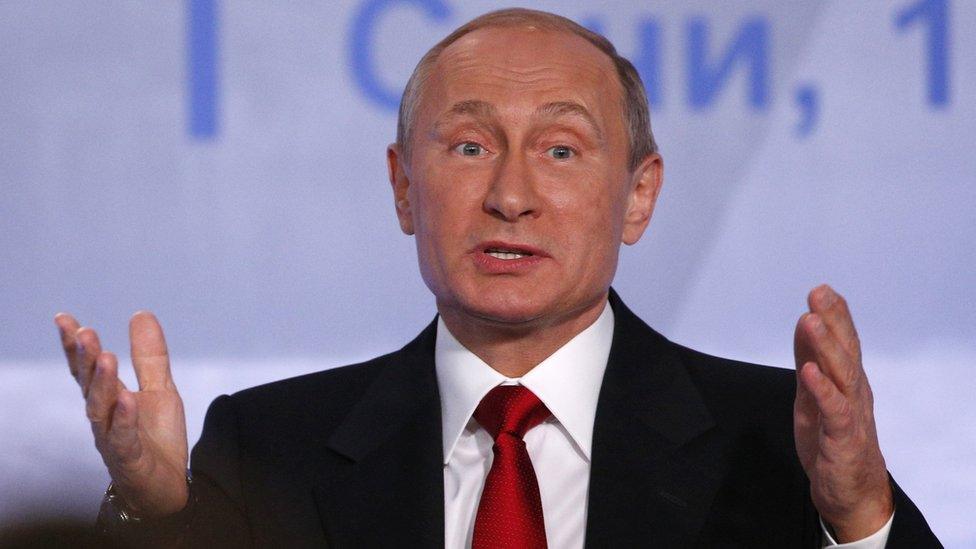Islamic State: Putin says Assad 'could work with rebels against IS'
- Published

Mr Putin appeared to reach out to the West in his speech
Vladimir Putin has suggested the Syrian government could be ready to work with rebel groups that are willing to fight against the so-called Islamic State.
Mr Putin said he had asked President Bashar al-Assad how he would view such a force during his surprise visit to Moscow on Tuesday.
"He answered: 'Positively'," Mr Putin told a conference with foreign dignitaries in southern Russia.
"We are contemplating this and will try to implement it," he added.
He called for Kurdish groups to join forces with the Syrian and Iraqi governments against IS.
However, opposition forces fighting on the ground in Syria have consistently demanded President Assad step down as a condition for negotiations on a political solution to the crisis.
This viewpoint was reiterated by US Secretary of State John Kerry on Thursday, who said the Syrian president was the "one thing" standing in the way of uniting Syrians and helping them to choose their own future leadership.
Mr Kerry is due to meet Russian Foreign Minister Sergei Lavrov, as well as their Turkish and Saudi counterparts in Vienna on Friday to discuss the conflict.
More than 250,000 Syrians have been killed and a million injured in more than four years of conflict that began with anti-government protests before escalating into full-scale civil war.

Analysis - Bridget Kendall, BBC diplomatic editor in Sochi
President Putin's comments were woven through with mixed messages and contradictions.
On the one hand he accused the US and its allies of playing a double game in Syria, attacking some terrorist groups while siding with others for their own ends. He said the West's attempt to divide terrorist groups into "moderate" and "non-moderate" was mistaken.
On the other hand, he also seemed to concede that Russia would need to bring the US-led coalition and Syria's moderate opposition forces on board for any political settlement to work. He said he still hoped the US would agree to work with Russia, and he'd even asked President Assad - who was in Moscow this week - if he could work with moderate opposition forces on the ground.
Mr Putin was clear he is ruling out partition for Syria.
He probably doesn't want Russia's air campaign to last too long, to avoid casualties.
So if he is serious about a peace deal, he may gauge that winning round more partners is the only way for any putative Russian plan for Syria not to fail.

Speaking at the Valdai discussion forum in Sochi, Mr Putin said Russia was close to exchanging data about militant positions in Syria with the West.
He said the terrorist threat represented an opportunity for Russia and the West to work together.
But he said Russia had no plans to expand its air strikes on the group into Iraq because the Iraqi government had not asked Russia for help.
'Red carpet welcome'
Military victory over jihadist groups would not solve all the problems in Syria, Mr Putin argued, but it would enable a political solution to get under way in which Syrians could decide their own fate.
And he chided the West for "dividing terrorists into moderates and non-moderates".
"You can't beat terrorism if terrorists are used as an excuse to oust undesirable regimes," he said.
The US criticised Bashar al-Assad's visit to Russia, accusing Mr Putin of putting out a "red carpet welcome" for the Syrian president, who it says used chemical weapons against Syrian civilians.
During his visit, Mr Assad said Russia's involvement had stopped "terrorism" becoming "more widespread and harmful" in Syria.